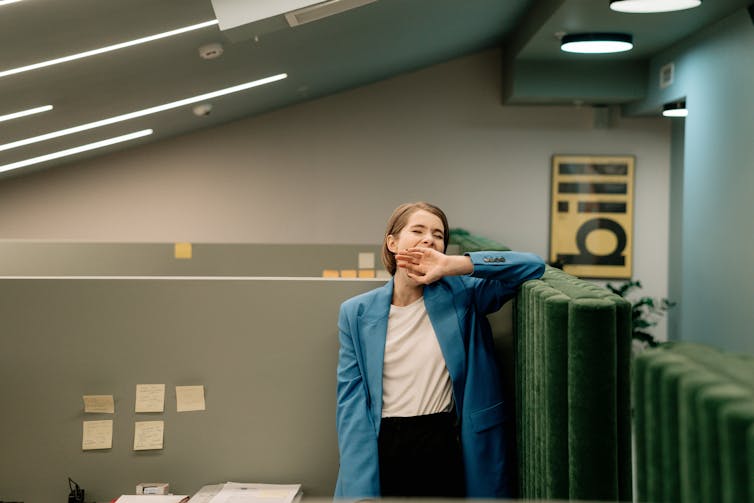Feeling flat now you’re #BackToWork? A post-holiday slump is normal, but these clues signal it’s time for a new job

Libby (Elizabeth) Sander, Bond University
If you’ve found yourself feeling a bit flat after returning to work (or outright hating your job) this year, you’re not alone. #BackToWork is trending for Australia on Tik Tok, with plenty of users lamenting the return to the office. A growing body of research also shows this feeling is pretty common.
But while there’s nothing new about the return-to-work blues, few companies have any strategy to facilitate readjustment to work after vacation.
So what does the research say on this issue, and what could employers do to address it?

What does the research say?
One study found worker health and wellbeing:
increased quickly during vacation, peaked on the eighth vacation day and had rapidly returned to baseline level within the first week of work resumption.
Another found:
short breaks have an advantage over longer vacations on some measures, and this may be explained by attributes of the environment and activities in which vacationers engaged.
But while you may feel uninspired in your first week back, hang in there: research has shown employees perceive they are more creative two weeks after returning from vacation.

Many of us were dreading work even before the Christmas break. A December 2022 survey of 100 working adults on LinkedIn showed 60% felt they had worked too much in 2022, while another study showed 46% of Australian employees feel burned out.
The pandemic introduced new stressors into almost every area of our lives. As many of these stressors go on over several years, the risk of burnout increases.
Providing a psychologically safe workplace
In a recent report on mental health and workplace, the Committee for Economic Development Australia noted poor mental health costs the Australian economy around A$70 billion dollars a year.
Employers should provide a psychologically safe workplace, along with access to mental health support.
Taking regular breaks, creating boundaries to stop work spilling into our personal lives, getting exercise and having other interests outside of work are important to reduce stress.
Taking holidays is also essential. One study found “health and wellbeing improve during vacation, but these positive vacation effects fade out within the first week of work resumption”. Even so, the same researchers noted vacations “may act as buffer against future stressors”.
But an October 2022 survey found 75% of Australians were not taking their annual leave due to workload and financial pressures.
This points to a broader issue that isn’t solved by announcing a new employee wellness initiative.
Wellness fads don’t work when the root cause remains
Organisations need to be aware wellness fads and token mindfulness programs do nothing to address stressors such as poor job design, overwork, inadequate management capability and poor organisational and leadership culture.
All the free lunch and in-office massages in the world will be of no use if you’re working in a toxic culture or have a narcissistic boss.
Sometimes, systemic change is needed. That can mean redesigning jobs, rethinking pay, changing organisational structure and addressing workload expectations.
Offering overworked employees yoga sessions, stress reduction workshops, meal vouchers or sessions on personal resilience are unlikely to make any difference.
What’s needed is an approach addressing the root causes of employee burnout.
If I’m dreading work this much, should I look for a new job?
While feeling a bit flat at work after a holiday is normal for a few weeks, some indicators suggest it’s time for a new job (or a longer break).
If you are still feeling flat a month after you return, it’s likely to be more than the post-vacation slump.
Getting support to discuss the causes is an important first step.
If your stressors are largely driven by the pressures of balancing responsibilities outside of work, you might ask your employer for flexibility with hours or working from home.
And while many companies are offering more flexibility since the pandemic, recent changes to federal laws will make it easier for employees to request flexible work.
So you’ve discussed your concerns with your manager – now what?
If there is a lack of genuine action to address poor organisational culture, inadequate leadership capability, continued overwork, and bad job design, then looking for a new job is probably a good idea.![]()
Libby (Elizabeth) Sander, MBA Director & Assistant Professor of Organisational Behaviour, Bond Business School, Bond University
This article is republished from The Conversation under a Creative Commons license. Read the original article.
Jobs Just For You, The HR Professional
Our weekly or daily email bulletins are guaranteed to contain only fresh employment opportunities
Latest Jobs
People Implementation Lead - Contract
New South Wales
Talent Acquisition Coordinator - Contract
Queensland
Blue Collar Recruiter - Contract
Western Australia
Organisational Safety Manager
Queensland
Workers Compensation Manager - Contract
New South Wales
HR Administrator
Western Australia
HR Advisor - Contract
New South Wales
People Risk & Compliance Advisor
New South Wales
HR Business Partner
Western Australia
HR Business Partner
Western Australia
HR Advisor- Temporary until end March 2026 - Contract
South Australia
Employee Relations Team Leader
Western Australia
FIFO Senior HR Advisor - Contract
Western Australia
HR Advisor - Contract
Western Australia
HR Advisor - Contract
Western Australia
Blue Collar Recruitment Advisor - Contract
Western Australia
Senior HR Leader
Western Australia
Rostering Partner - fully remote contract
New South Wales
HR Generalist - Contract
Victoria
HR Advisor - Contract
Western Australia
HR Business Partner - Transport Industry
South Australia
People & Talent Acquisition Coordinator - Contract
Queensland
Organisational Development Specialist - Contract
Queensland
HR Advisor - Contract
New South Wales
A07 Senior Advisor - Integrity and Workplace Relations - Contract
Queensland
People, Performance & Culture (PPC) Systems & Reporting Analyst
Victoria
People Manager - Contract
Western Australia
Learning & Development Manager
New South Wales
People and Culture Business Partner
Western Australia
HR Business Partner - Contract
Western Australia
HR Business Partner - Contract
New South Wales
Human Resources Business Partner
Western Australia